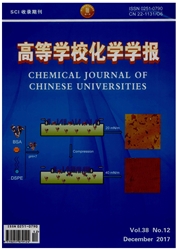

 中文摘要:
中文摘要:
酶促开环聚合方法是近年来迅速发展起来的一种新的聚合物合成方法.传统的化学聚合方法往往要求无水、无氧以及高纯的金属催化剂等苛刻的反应条件,对于生物医用高分子材料而言,残留的金属催化剂也必须在反应后彻底清除,否则可能造成的毒副作用会直接影响生物医用材料的生物相容性和使用安全性.而酶促开环聚合方法作为环境友好方法的一种,能有效地克服以上传统化学方法的不足,保证所制备聚合物材料的生物相容性和使用安全性.聚占ε-己内酯是一类生物可降解和生物相容性高分子,被广泛用作生物医用材料和包装材料.聚ε-己内酯通常是通过七元环的内酯(ε-己内酯;ε-CL)的开环聚合反应制备的,近年来也有一些用酶促开环聚合方法来制备聚ε-己内酯的报道。
 英文摘要:
英文摘要:
Porcine pancreas lipase (PPL) immobilized on narrow distributed micron glass beads was employed successfully for ring-opening polymerization of ε-caprolactone (CL). Different polymerization conditions such as enzyme concentration, reaction temperature and reaction time were studied. The results showed that Mn of the resulting PCL was significantly increased compared with that catalyzed by PPL. Higher temperature and longer reaction time both contributed to gaining PCL with a higher molecular weight, while the yield had almost no change. In addition, for evaluating the recyclibihy of immobilized PPL on narrow distributed micron glass beads for the ring-opening polymerization of CL, we adopted the most severe reaction conditions ( 180 ℃, 240 h) in the recycling experiments. It was found that the recovered immobilized PPL could be used again a compatible high catalytic activity. The highest Mn of 21 300 of PCL could be obtained at a mass fraction of 5.18% of the reused immobilized PPL at 180℃ for 240 h, which is the highest Mn of PCL catalyzed by PPL. The excellent recyclability of immobilized PPL on narrow distributed micron glass beads is very helpful to its further industry applications.
 同期刊论文项目
同期刊论文项目
 同项目期刊论文
同项目期刊论文
 期刊信息
期刊信息
